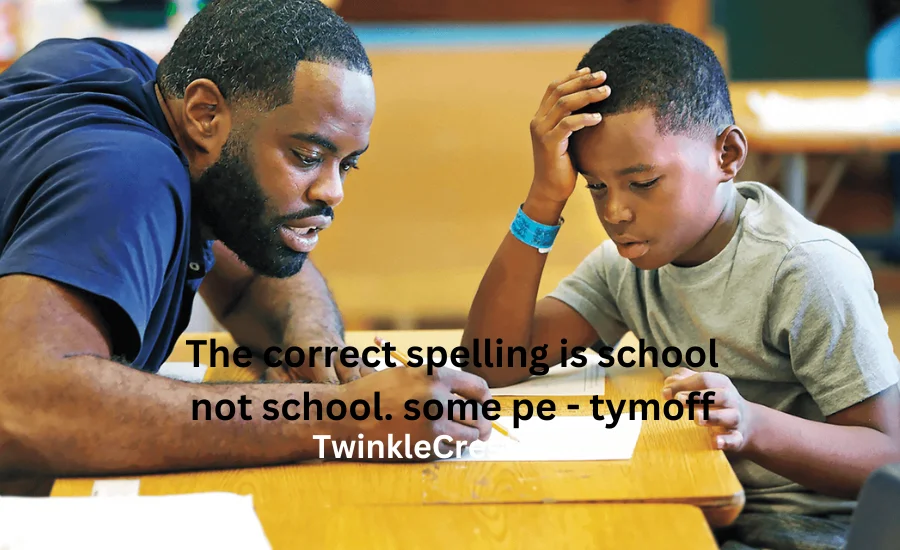Have you ever questioned whether “scholl” might be the correct spelling for “school”? The correct spelling is school not school. some pe – tymoff accuracy is crucial, not just for clear communication but also for maintaining credibility. In this article, we delve into why “school” is the proper spelling and explore the significance of this word beyond its educational context. Understanding the correct spelling of “school” helps us appreciate the role language plays in effective communication and professional presentation. Discover the impact of proper spelling and the intriguing journey of this commonly used term.
Overview
In today’s rapid communication environment, it’s easy for The correct spelling is school not school. some pe – tymoff. While these errors might be overlooked in informal text messages, accurate spelling is essential in academic and professional contexts.
In this article, we address a fundamental question: What is the correct spelling of “school”? Though it might seem like a simple matter, spelling “school” correctly can sometimes be more challenging than expected. We’ll explore why precision in spelling matters and provide clarity on this commonly misunderstood term.
How the correct spelling is school not school. some pe – tymoff

The correct spelling is school not school. some pe – tymoff is the correct spelling, it’s not uncommon to see it mistakenly written as “scholl.” Several factors contribute to this error:
- Typing Errors: On keyboards, the keys for “o” and “l” are positioned close to each other. A minor slip, particularly on mobile devices, can easily result in typing “scholl” instead of “school.”
- Unfamiliarity: Individuals who are not familiar with the word “school” might attempt to phonetically spell it, leading to the misspelling “scholl.”
- Autocorrect Issues: Although autocorrect tools are designed to assist with spelling, they are not perfect. Occasionally, these tools might incorrectly suggest “scholl” as a substitute for “school.”
Understanding these common causes can help in reducing such errors and improving overall spelling accuracy.
The Definitive Spell
The correct spelling is school not school. some pe – tymoff, Effective communication is essential in all areas of life. Whether you’re composing a college essay, writing an email, or making personal notes, correct spelling is crucial. It reflects professionalism, attention to detail, and a solid understanding of the language. Although a single typo might not completely undermine your message, frequent spelling errors can create a negative impression and undermine your efforts.
In educational settings, accurate spelling is a key indicator of literacy skills. Schools play a significant role in developing these skills, and consistently using correct spelling supports effective learning. Mastery of spelling becomes a valuable habit that benefits various aspects of life, from academic achievements to career success.
Why Accurate Spelling of “School” is Crucial

So, why is it essential to The correct spelling is school not school. some pe – tymoff correctly? Here are a few key reasons:
- Clarity and Professionalism: Accurate spelling enhances the clarity and professionalism of written communication. Mistakes and typos can give the impression of carelessness, particularly in formal contexts such as academic papers, business correspondence, or resumes.
- Establishing a Strong Foundation: Correct spelling from an early age supports the development of robust literacy skills. Consistently seeing “school” spelled correctly helps children learn the right letter combinations and pronunciation, reinforcing their understanding of language.
- Effective Communication: Proper spelling is crucial for clear communication. For instance, a school newsletter listing “scholl activities” could lead to confusion for parents trying to organize their child’s schedule. Accurate spelling avoids such misunderstandings and ensures that information is conveyed accurately.
Unpacking the Significance of “School”
The term “school” extends beyond its basic definition and appears in various expressions within our language. Here are some notable uses:
- School of Thought: This phrase denotes a particular philosophical or theoretical perspective embraced by a group. For example, one might refer to the “Stoic school of thought” to discuss a specific approach to philosophy.
- Old School: This expression describes something traditional or considered outdated, often in contrast to modern practices. For instance, someone might say, “My methods are a bit old school, but they remain effective.”
- Go to School on Someone: This informal phrase means to learn valuable lessons, often through observing or experiencing challenges. For example, “He really went to school on the basketball court that day,” suggests he learned a lot from a tough experience.
The Need to Correct ‘Scholl’ Before It Gains Traction
Even the most careful writers can occasionally overlook a typo. Proofreading serves as the crucial final step in catching spelling errors. Dedicating time to thoroughly review your work before finalizing it can significantly enhance the quality of your writing.
Effective Proofreading Strategies
Proofreading Tips for Enhanced Accuracy
- Read Aloud: Reading your text out loud can help you identify errors that might be missed during silent reading. This technique forces you to slow down and pay closer attention to each word.
- Use Spellcheck Wisely: While spellcheckers are useful, they should not be your only line of defense. They can miss context-specific errors, so it’s important to manually review your work as well.
- Take Breaks: Step away from your writing and return with a fresh perspective. Taking breaks can help you spot mistakes you may have overlooked during the initial editing phase
The Fun Side of Spelling Errors

While accurate spelling is crucial, there’s always a place for a touch of humor. Typos and misspellings can sometimes lead to amusing situations, adding a bit of lightness and shared laughter to our interactions.
For instance, if a social media post advertises an upcoming “scholl play,” it might spark a wave of playful comments and gentle corrections from readers. These light-hearted exchanges can turn minor errors into opportunities for fun and camaraderie.
The Significance of Selecting the Right Option
The English language is both rich and intricate, making the choice of words crucial for effective communication. While “school” and “scholl” might look similar, using the correct spelling is essential for precision and clarity.
The correct spelling is school not school. some pe – tymoff, if you were directing a new student, would you say, “The library is next to the scoll building,” or “The library is next to the school building”? Clearly, the second option is more precise and avoids potential confusion, illustrating how proper spelling enhances the clarity of your message.
Enhancing Literacy Competence
Developing strong literacy skills is essential for academic and personal success. Accurate spelling is a fundamental aspect of literacy, enabling clear and effective communication.
To help children build strong spelling skills, consider these strategies:
- Consistent Reading: Regular exposure to books and other written materials enhances letter recognition and word patterns, fostering better spelling skills.
- Engaging Games and Activities: Interactive games that involve spelling challenges or matching sounds to letters can make the learning process enjoyable and motivating.
- Encouragement and Praise: Offering positive reinforcement for a child’s spelling efforts helps boost their confidence and encourages continued learning.
How ‘School’ Can Have Different Interpretations
The correct spelling is school not school. some pe – tymoff extends beyond its basic definition and can acquire different meanings based on the context. Here are a few examples:
- School of Fish: This phrase describes a large group of fish swimming together in a coordinated way.
- Film School: This refers to an educational institution specializing in training and instruction in filmmaking.
- School Bus: This is a vehicle specifically designed to transport students to and from their educational institutions.
Recognizing the various ways “school” is used can enrich your vocabulary and improve your communication skills.
Exploring How Different Schools Fulfill Various Needs

The correct spelling is “school,” not “scholl.” Even the most careful writers can make mistakes. Proofreading is essential to catching these errors before they spread. Here are a few reasons why accurate spelling matters:
- Clarity and Professionalism: Proper spelling enhances the clarity of your communication and reflects professionalism. Mistakes can convey carelessness, particularly in formal settings like academic papers or business correspondence.
- Building a Strong Foundation: Early exposure to correct spelling supports the development of literacy skills in children. Consistent use of the word “school” correctly reinforces proper letter combinations and pronunciation.
- Effective Communication: Accurate spelling ensures your message is understood as intended. For example, “The library is next to the school building” is clearer and more effective than “The library is next to the scholl building.”
Understanding these aspects of spelling helps in maintaining effective and professional communication.
Final Words
Accurate spelling plays a crucial role in effective communication and professional credibility. The correct spelling is “school,” not “scholl.” Understanding and using the correct spelling of words like “school” is essential, especially in educational and professional contexts. Errors such as “scholl” can result from typing mistakes, unfamiliarity, or autocorrect issues, but they can undermine the clarity and professionalism of your writing. By prioritizing accurate spelling, you ensure that your message is clear, precise, and impactful. Remember, The correct spelling is school not school. some pe – tymoff, underscores the importance of attention to detail in all forms of communication.
FAQs
1. What is the correct spelling: “school” or “scholl”?
The correct spelling is “school.” “Scholl” is a common misspelling that can occur due to typing errors or unfamiliarity with the word.
2. Why is it important to spell “school” correctly?
Spelling “school” correctly ensures that your writing is understood and reflects attention to detail.
3. What are common reasons people misspell “school” as “scholl”?
Common reasons include typing errors, especially on keyboards where the letters “o” and “l” are close together, unfamiliarity with the word, and autocorrect issues.
4. How can I avoid misspelling “school”?
To avoid misspelling “school,” practice careful typing, use spellcheck tools, and review your work to catch any errors before finalizing it.
5. Why does the word “school” matter beyond education?
The word “school” has various meanings and uses, such as in phrases like “school of thought” or “film school,” making it a versatile term in the English language.
6. How does proper spelling affect professional communication?
Proper spelling enhances the clarity and professionalism of your communication, preventing misunderstandings and reflecting a strong command of language.
7. What role does proofreading play in catching spelling errors?
Proofreading is crucial for identifying and correcting spelling errors, ensuring that your writing is accurate and polished before it is shared or published.
8. Can spelling errors impact my credibility?
Yes, frequent spelling errors can negatively impact your credibility, especially in professional or academic settings, where accuracy and attention to detail are valued.
9. How can I improve my spelling skills?
Improving spelling skills can be achieved through regular reading, practicing writing, and using tools like spellcheck and dictionaries to learn correct spellings.
10. What are some fun ways to learn and remember the correct spelling of words like “school”?
Engaging in spelling games, using mnemonic devices, and practicing with flashcards can make learning and remembering correct spellings more enjoyable and effective.
Elevate your knowledge and explore more topics at TwinKle crest.




